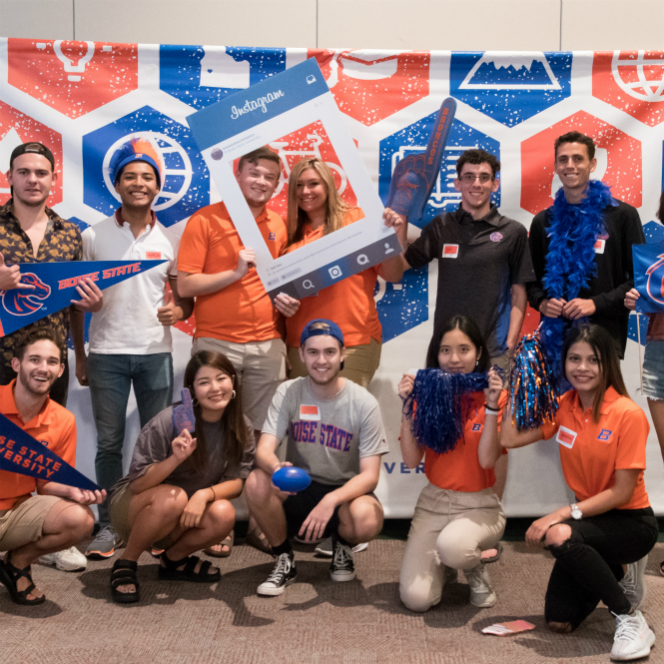Module 01: Bonjour!
Module 01: L’évaluation de la production écrite et l’expression orale

International Student Services (ISS) is compiling a list of English speaking students who would like to serve as liaisons between incoming French speaking students at Boise State University and the Treasure Valley community. You decide to sign up as a liaison.
Part One:
Write a short biography of yourself, in French, to post on the ISC website. Include a greeting, your name, age, where you are from, birthday, your year of study at Boise State, and a good-bye.
Rubric, Part One:
| Criteria | Exceeds Expectations | Meets | Expectations | Does Not Meet Expectations |
|---|---|---|---|---|
| Strong | Minimal | |||
| Language Function | You can create with language by combining and recombining known elements successfully into more than memorized sentences. | You use mostly memorized language with some attempts to create original sentences. You can present topics related to basic personal information and some activities. | You use memorized language only, familiar language. | |
| Text Type | You use simple sentences and some connected sentences. | You use simple sentences and memorized phrases. | You use words, phrases, chunks of language, and lists. | You use isolated words. |
| Impact | Your writing is clear and organized. You Include an unexpected feature that captures interest and attention of audience. | Your writing is clear and organized. | Your writing is clear and organized. | Your writing may be either unclear or unorganized. You use minimal to no effort to maintain audience’s attention. |
| Comprehensibility | Your writing is generally understood by those accustomed to interacting with non-natives. | Your writing is understood with occasional difficulty. | Your writing is understood, although often with difficulty. | Most of what you write may be unintelligible or only understood with repetition. |
| Language Control | You are most accurate when producing simple sentences in present tense. Your accuracy decreases as language becomes more complex. | You are most accurate with memorized language, including phrases. Your accuracy decreases when creating and trying to express personal meaning. | Your accuracy is limited to memorized words. Your accuracy may decrease when attempting to communicate beyond the word level. | You have little accuracy even with memorized words. |
Part Two:
You will now revise your biography from part one based on the feedback from your instructor. Next, you will record an introduction of yourself including this information to be posted on the Global Learning Opportunities website. This should be completed entirely in French. This video will help international students and community members to get to know you! Remember that the video should be polished and display enthusiasm. You may use one of the following tools to record your biography:
- Adobe Express Video (You can include accompanying visuals with this tool)
- Canva (You can include accompanying visuals with this tool)
- Record a video using a mobile device, tablet or web camera. (The WLRC has devices available for check out!)
Rubric, Part Two:
| Criteria | Exceeds Expectations | Meets | Expectations | Does Not Meet Expectations |
|---|---|---|---|---|
| Strong | Minimal | |||
| Language Function | Creates with language by combining and recombining known elements; is able to express personal meaning in a basic way. Handles successfully a number of uncomplicated communicative tasks and topics necessary for survival in target-language cultures. | Uses mostly memorized language with some attempts to create. Handles a limited number of uncomplicated communicative tasks involving topics related to basic personal information and some activities, preferences, and immediate needs. | Uses memorized language only, familiar language. | Has no real functional ability. |
| Text Type | Uses simple sentences and some strings of sentences. | Uses simple sentences and memorized phrases. | Uses words, phrases, chunks of language, and lists. | Uses isolated words. |
| Impact | Presented in a clear and organized manner. Presentation illustrates originality, rich details, and an unexpected feature that captures interest and attention of audience. | Presented in a clear and organized manner. Presentation illustrates originality and features rich details, visuals, and/or organization of the text to maintain audience’s attention and/or interest. | Presented in a clear and organized manner. Some effort to maintain audience’s attention through visuals, organization of the text, and/or details. | Presentation may be either unclear or unorganized. Minimal to no effort to maintain audience’s attention. |
| Comprehensibility | Is generally understood by those accustomed to interacting with non-natives, although repetition or re-phrasing may be required. | Is understood with occasional difficulty by those accustomed to interacting with non-natives, although repetition or re-phrasing may be required. | Is understood, although often with difficulty, by those accustomed to interacting with non-natives. | Most of what is said may be unintelligible or only understood with repetition. |
| Language Control | Is most accurate when producing simple sentences in present time. Pronunciation, vocabulary, and syntax are strongly influenced by the native language. Accuracy decreases as language becomes more complex. | Is most accurate with memorized language, including phrases. Accuracy decreases when creating and trying to express personal meaning. | Accuracy is limited to memorized words. Accuracy may decrease when attempting to communicate beyond the word level. | Most of what is said may be unintelligible or only understood with repetition. |

